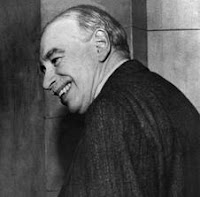.jpg) Last week, an
Austrian-School economist, Robert Wenzel, gave a
speech to the New York Federal Reserve, and separately Bloomberg hosted a television debate
between Ron Paul, who is running for the Republican Presidential nomination,
and Professor Paul
Krugman, one of the
foremost advocates of Keynesian economic policy. The debate between advocates
of big government and small government is beginning to move into the media.
Last week, an
Austrian-School economist, Robert Wenzel, gave a
speech to the New York Federal Reserve, and separately Bloomberg hosted a television debate
between Ron Paul, who is running for the Republican Presidential nomination,
and Professor Paul
Krugman, one of the
foremost advocates of Keynesian economic policy. The debate between advocates
of big government and small government is beginning to move into the media. It is not so much a question of who wins the debate:
rather it is that the minority Austrian view is being noted by a few economists
at the Fed, and that Krugman, who last year turned down an opportunity to
debate economics with Robert Murphy of the Ludwig von Mises Institute in
America, presumably felt more comfortable defending his interventionist beliefs
against a politician than a trained economist. Whatever your opinion, the fact
that some establishment economists are at least curious about Austrian
economics and that Ron Paul is getting air-time for his views is a good thing,
if only because it makes people aware there is an alternative to establishment
economics.
It is not so much a question of who wins the debate:
rather it is that the minority Austrian view is being noted by a few economists
at the Fed, and that Krugman, who last year turned down an opportunity to
debate economics with Robert Murphy of the Ludwig von Mises Institute in
America, presumably felt more comfortable defending his interventionist beliefs
against a politician than a trained economist. Whatever your opinion, the fact
that some establishment economists are at least curious about Austrian
economics and that Ron Paul is getting air-time for his views is a good thing,
if only because it makes people aware there is an alternative to establishment
economics.It seems that Wenzel’s invitation was in part because he had successfully forecast the housing crash, while the Fed’s economists had been unable to foresee it. In the Q&A that followed, one economist stated that before the Fed, there had been worse economic crashes. Putting aside the impossibility of ever establishing whether or not this is actually true, such crises as there were originated in either natural disasters, such as crop failures in an agricultural-based economy, or the expansion of bank credit fuelling speculative bubbles. Today crop failures do not have the same impact, but fluctuating levels of bank credit certainly do and are a key factor behind the accumulation of debt.
Ron Paul’s debate with Krugman received more attention
than Wenzel’s speech, given that it was televised. Their debating techniques
differed, with Paul sticking to facts, emphasising the unproductive cost of big
government and the Fed’s destruction of savings through monetary expansion.
Krugman put forward his beliefs, based on his version of history, which we were
required to accept without question. The problem with history is that analysis
of it is always subjective. Canute apparently sat on his throne on the beach,
and commanded the tide to recede. Did he do this because he believed he was a
demi-god who could command the elements, of did he wish to show his admiring
subjects that he wasn’t all-powerful? Both views are valid depending on the
position the historian takes, and that is the weakness of any historical
analysis.
There is nothing new in this. Carl Menger – the founder
of the Austrian School – came up against the German Historical School, which
relied on a subjective interpretation of Prussian history for economic policy.
It was this school that derisively termed Menger’s school as provincial, or
Austrian.
Not much has changed in economic debating techniques.
But please note that Austrian economics, which argues from a strong and
well-reasoned theoretical analysis of human action, still endues and is
enjoying a revival. The Historical School is now a footnote in history, as
surely as Keynesianism will be one day.
No comments:
Post a Comment